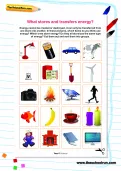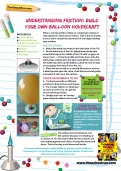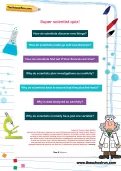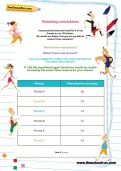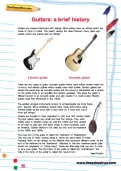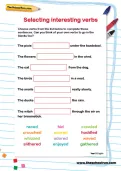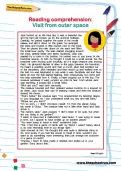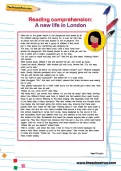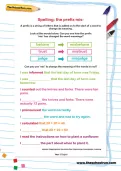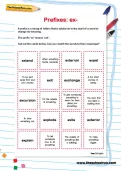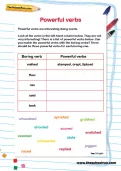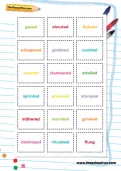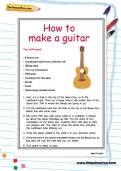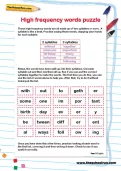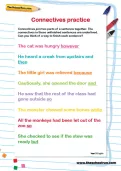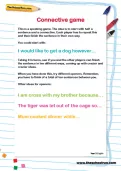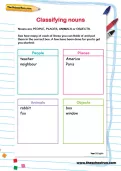This information text on guitars comes with questions for your child to practise to help them with retrieval of information and naming features of such a text.
or
Register to add to your saved resources
Already a subscriber? to view this content.
This reading comprehension gives a passage of fiction text for children to read. The questions then encourage children to retrieve information and infer the way that characters are feeling.
or
Register to add to your saved resources
Already a subscriber? to view this content.
This worksheet encourages children to think about the appropriate verb for a sentence and also to think about their own verbs.
or
Register to add to your saved resources
Already a subscriber? to view this content.
A Year 3 reading comprehension text and activity created by an experienced primary school teacher to help children improve their reading skills.
This reading comprehension encourages children to think about the feelings and behaviour of characters in a text. It includes answers to the questions.
or
Register to add to your saved resources
Already a subscriber? to view this content.
This reading comprehension includes a passage of fiction which is followed by questions designed to prompt children to retrieve information and infer characters' feelings. It also includes answers.
or
Register to add to your saved resources
Already a subscriber? to view this content.
This reading comprehension consists of a passage of fiction which is then followed by questions prompting children to retrieve information from the text and infer characters' feelings. Answers are also included.
or
Register to add to your saved resources
Already a subscriber? to view this content.
This worksheet demonstrates to children how the prefix mis- changes the meaning of a word. They are then encouraged to use words starting mis- in sentences.
or
Register to add to your saved resources
Already a subscriber? to view this content.
Use this worksheet to familiarise your child with words starting with the prefix 'ex'. It provides them with an activity where they need to match the word with the meaning.
or
Register to add to your saved resources
Already a subscriber? to view this content.
Encourage your child to think about the meanings of powerful verbs, by matching three interesting verbs to one boring one.
or
Register to add to your saved resources
Already a subscriber? to view this content.
Use these verb cards to play two different games which will help your children to become more familiar with interesting verbs.
or
Register to add to your saved resources
Already a subscriber? to view this content.
Use this reading comprehension to help your child think about the way instruction texts are set out and also to help them get used to retrieving information from a text.
or
Register to add to your saved resources
Already a subscriber? to view this content.
Use this to help your child with their spellings and knowledge of syllables. They need to cut out all the syllables and then see how quickly they can put them back together as words.
or
Register to add to your saved resources
Already a subscriber? to view this content.
This worksheet gives sentence starters with connectives for your child to complete in imaginative ways.
or
Register to add to your saved resources
Already a subscriber? to view this content.
This game will encourage your child to use connectives when they are speaking. They will then be more likely to use sentences with connectives in their writing.
or
Register to add to your saved resources
Already a subscriber? to view this content.
This worksheet explains the difference between concrete and abstract nouns. It then gives a paragraph of text for children to underline the different types of nouns.
or
Register to add to your saved resources
Already a subscriber? to view this content.
This worksheet explains the different types of nouns and encourages your child to collect and classify them.
or
Register to add to your saved resources
Already a subscriber? to view this content.
Can you explain multiplication to your child? Our guide offers a quick review of what you need to know, including partitioning numbers, column multiplication and grid methods.
or
Register to add to your saved resources
Already a subscriber? to view this content.
Number lines, the counting on method and 'borrowing' numbers are all covered in our guide to subtraction, a complete overview of what your child will be taught about 'taking away' numbers at school.
or
Register to add to your saved resources
Already a subscriber? to view this content.
Find out how addition is taught in schools and the addition topics your child might ask about. This guide explains what you need to know about hops, partitioning numbers, column addition and long addition.
or
Register to add to your saved resources
Already a subscriber? to view this content.
From sharing and grouping to shorthand division and chunking, this is your step-by-step guide to how your child will be taught to divide numbers in KS2.
or
Register to add to your saved resources
Already a subscriber? to view this content.
